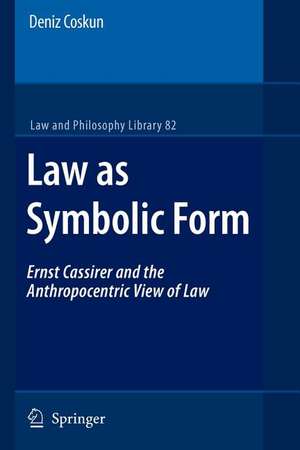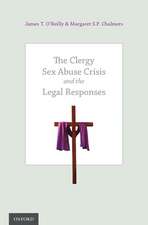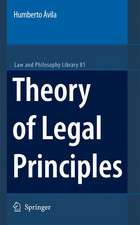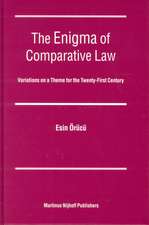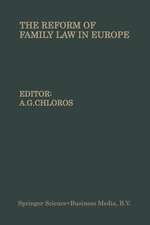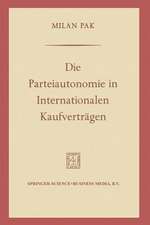Law as Symbolic Form: Ernst Cassirer and the Anthropocentric View of Law: Law and Philosophy Library, cartea 82
Autor Deniz Coskunen Limba Engleză Paperback – 23 noi 2010
| Toate formatele și edițiile | Preț | Express |
|---|---|---|
| Paperback (1) | 1112.78 lei 6-8 săpt. | |
| SPRINGER NETHERLANDS – 23 noi 2010 | 1112.78 lei 6-8 săpt. | |
| Hardback (1) | 1118.93 lei 6-8 săpt. | |
| SPRINGER NETHERLANDS – 6 iul 2007 | 1118.93 lei 6-8 săpt. |
Din seria Law and Philosophy Library
- 20%
 Preț: 813.10 lei
Preț: 813.10 lei - 20%
 Preț: 569.00 lei
Preț: 569.00 lei - 18%
 Preț: 1225.16 lei
Preț: 1225.16 lei - 18%
 Preț: 950.66 lei
Preț: 950.66 lei - 15%
 Preț: 583.43 lei
Preț: 583.43 lei - 15%
 Preț: 639.25 lei
Preț: 639.25 lei - 15%
 Preț: 641.53 lei
Preț: 641.53 lei - 18%
 Preț: 893.84 lei
Preț: 893.84 lei - 24%
 Preț: 797.37 lei
Preț: 797.37 lei - 15%
 Preț: 579.84 lei
Preț: 579.84 lei - 15%
 Preț: 644.95 lei
Preț: 644.95 lei - 18%
 Preț: 895.76 lei
Preț: 895.76 lei - 15%
 Preț: 644.95 lei
Preț: 644.95 lei - 20%
 Preț: 571.84 lei
Preț: 571.84 lei - 15%
 Preț: 642.03 lei
Preț: 642.03 lei - 18%
 Preț: 1232.26 lei
Preț: 1232.26 lei - 18%
 Preț: 1116.05 lei
Preț: 1116.05 lei - 15%
 Preț: 655.92 lei
Preț: 655.92 lei - 18%
 Preț: 833.54 lei
Preț: 833.54 lei - 18%
 Preț: 898.26 lei
Preț: 898.26 lei - 18%
 Preț: 1016.63 lei
Preț: 1016.63 lei -
 Preț: 390.25 lei
Preț: 390.25 lei - 24%
 Preț: 700.88 lei
Preț: 700.88 lei - 18%
 Preț: 999.60 lei
Preț: 999.60 lei - 18%
 Preț: 1115.77 lei
Preț: 1115.77 lei - 18%
 Preț: 1107.88 lei
Preț: 1107.88 lei - 15%
 Preț: 637.46 lei
Preț: 637.46 lei - 18%
 Preț: 781.94 lei
Preț: 781.94 lei - 24%
 Preț: 815.51 lei
Preț: 815.51 lei - 18%
 Preț: 786.18 lei
Preț: 786.18 lei - 18%
 Preț: 735.21 lei
Preț: 735.21 lei - 15%
 Preț: 653.33 lei
Preț: 653.33 lei - 18%
 Preț: 782.10 lei
Preț: 782.10 lei
Preț: 1112.78 lei
Preț vechi: 1357.05 lei
-18% Nou
Puncte Express: 1669
Preț estimativ în valută:
212.92€ • 222.31$ • 176.23£
212.92€ • 222.31$ • 176.23£
Carte tipărită la comandă
Livrare economică 05-19 aprilie
Preluare comenzi: 021 569.72.76
Specificații
ISBN-13: 9789048175840
ISBN-10: 9048175844
Pagini: 400
Ilustrații: XII, 386 p.
Dimensiuni: 165 x 240 x 21 mm
Greutate: 0.56 kg
Ediția:Softcover reprint of hardcover 1st ed. 2007
Editura: SPRINGER NETHERLANDS
Colecția Springer
Seria Law and Philosophy Library
Locul publicării:Dordrecht, Netherlands
ISBN-10: 9048175844
Pagini: 400
Ilustrații: XII, 386 p.
Dimensiuni: 165 x 240 x 21 mm
Greutate: 0.56 kg
Ediția:Softcover reprint of hardcover 1st ed. 2007
Editura: SPRINGER NETHERLANDS
Colecția Springer
Seria Law and Philosophy Library
Locul publicării:Dordrecht, Netherlands
Public țintă
ResearchCuprins
Introduction. Part I: Cassirer as a Public Person. Introduction. Chapter 1: What was Cassirer’s public engagement with Weimar? Introduction. 1.1 What was the socio-political context that marked (the transition to) Weimar? 1.2 What was the politico-historical context of the Weimar Constitution? 1.3 What was Cassirer’s constitutional engagement? Conclusion. Chapter 2: Cassirer and Heidegger. An Intermezzo on Magic Mountain (1929). Introduction. 2.1 What was the Cassirer-Heidegger debate? 2.2 What was the Cassirer-Heidegger debate from a jurisprudential perspective? Conclusion. Chapter 3: Cassirer in Exile: An Essay in the Recovery of Individual Moral Judgment. Introduction. 3.1 What was the Cambridge School of Platonism? 3.2 What was the contribution of Greek culture? 3.3 What was the contribution of the Cambridge School of Platonism? 3.4 What was the philosophical friendship between Schweitzer and Cassirer? 3.5 What are the humanistic premises of Cassirer’s philosophy of culture? Conclusion. Chapter 4: The Politics of Myth. Cassirer’s Pathology of the Totalitarian State. Introduction. 4.1 What was Cassirer’s critique of life philosophy? 4.2 What was the cultural crisis perceived by Cassirer? 4.3 How did the technological age contribute to the cultural crisis? 4.4 What are the characteristics of the myth of the state? 4.5 What is the Politics of Myth? Conclusion. Conclusion to Part I . Part II: Law as Symbolic Form. Introduction. Chapter 5: What is the Philosophy of Symbolic Forms? Introduction. 5.1 What are the objectives of the philosophy ofsymbolic forms? 5.2 What are the characteristics of symbolic forms? 5.3 What is the significance of the interplay between myth and language? 5.4 What is the hermeneutical dimension of Cassirer’s philosophy of culture? 5.5 What is the ethical dimension of Cassirer’s metaphysics of culture?Conclusion. Chapter 6: What is Law as Symbolic Form? Introduction. 6.1 What explains for Cassirer’s engagement with Law as Symbolic Form? 6.2 What is Cassirer’s critique of Scandinavian Realist jurisprudence? 6.3 What are the mythical, the representative, and the symbolic phases in law? 6.4 What is Cassirer’s philosophical justification of human rights? Conclusion. Chapter 7: The linguistic turn of social contract theory. Introduction. 7.1 What is the social contract for Cassirer? 7.2 What are the conditions for the possibility of a promise? Conclusion. Conclusion to Part II. Part III: Assessment: Cassirer in Context. Introduction. Chapter 8: What is Cassirer’s Position Relative to Neo-Kantianism? Introduction. 8.1 What was neo-Kantianism? 8.2 What was the contribution of the Marburg School of neo-Kantianism? 8.3 What was the critique exerted upon neo-Kantianism? 8.4 What were Cassirer’s achievements above and beyond neo-Kantianism? Conclusion. Chapter 9: A Revival of Neo-Kantian Jurisprudence? Law as Symbolic Form in Context. Introduction. 9.1 What was neo-Kantian jurisprudence? 9.2 What was the jurisprudence of the Marburg School of neo-Kantianism? 9.3 What was the jurisprudence Hermann Cohen envisioned? 9.4 What is the social contract theory of Hermann Cohen?9.5 What were the basic objections raised against Marburg jurisprudence? Conclusion. Conclusion to Part III. Chapter 10: Conclusion. Primary Literature. Secondary literature. Index.
Recenzii
From the reviews:
“Deniz Coskun is convinced that Ernst Cassirer’s work is vital for those legal and socio-legal scholars who … believe that philosophy is crucial to the study of law. … It is scholarly, careful, and thorough, detailing Cassirer’s position on human rights, ethics, and semiotics, and explaining his complex relations with German neo-Kantianism. … In sum, Coskun’s book will prove to be a valuable tool for those who want the law to be understood in terms of meaning and ethics … .” (Gary Wickham, International Journal for the Semiotics of Law, Vol. 22, 2009)
“Deniz Coskun is convinced that Ernst Cassirer’s work is vital for those legal and socio-legal scholars who … believe that philosophy is crucial to the study of law. … It is scholarly, careful, and thorough, detailing Cassirer’s position on human rights, ethics, and semiotics, and explaining his complex relations with German neo-Kantianism. … In sum, Coskun’s book will prove to be a valuable tool for those who want the law to be understood in terms of meaning and ethics … .” (Gary Wickham, International Journal for the Semiotics of Law, Vol. 22, 2009)
Textul de pe ultima copertă
Jurisprudence, according to Cassirer, is not merely the systematic, conceptual pursuance of ethics. They are separate domains for Cassirer, and both direct their claims differently on the individual. Whereas ethics concerns the motives of the individual, law ultimately achieves a cosmos for our world of outward actions. However, they are not separated by a neutral line or a vacuum. For law to have effect as a symbolic form it is necessary that it reflects the law in the mind of people i.e., that one could and ought to have assented to it out of ethical principles and maxims. The conceptual analysis of law goes hand to hand with its genetic account. Both ethics and law are products of, spring forth from the formative or symbolic powers of man, and although, as any other symbolism, they might confront us as something objective, i.e., as part of reality that is beyond our immediate reach, ultimately we must always bring them to account to their very source: our independent and individual moral judgment.
In this book we describe the rule of law as the reign of persuasion rather than the reign of force, and democracy as the reign by persuasion rather than the reign by force.
In this book we describe the rule of law as the reign of persuasion rather than the reign of force, and democracy as the reign by persuasion rather than the reign by force.
Caracteristici
Synthesizes a vast amount of current Cassirer-literature and makes a contribution to jurisprudence First systematic elaboration on law as a symbolic form Sheds new lights on a still dark area of intellectual and jurisprudential thought New insights relevant for the Kelsen debate, in particular re the question of legal validity and its foundational underpinning
